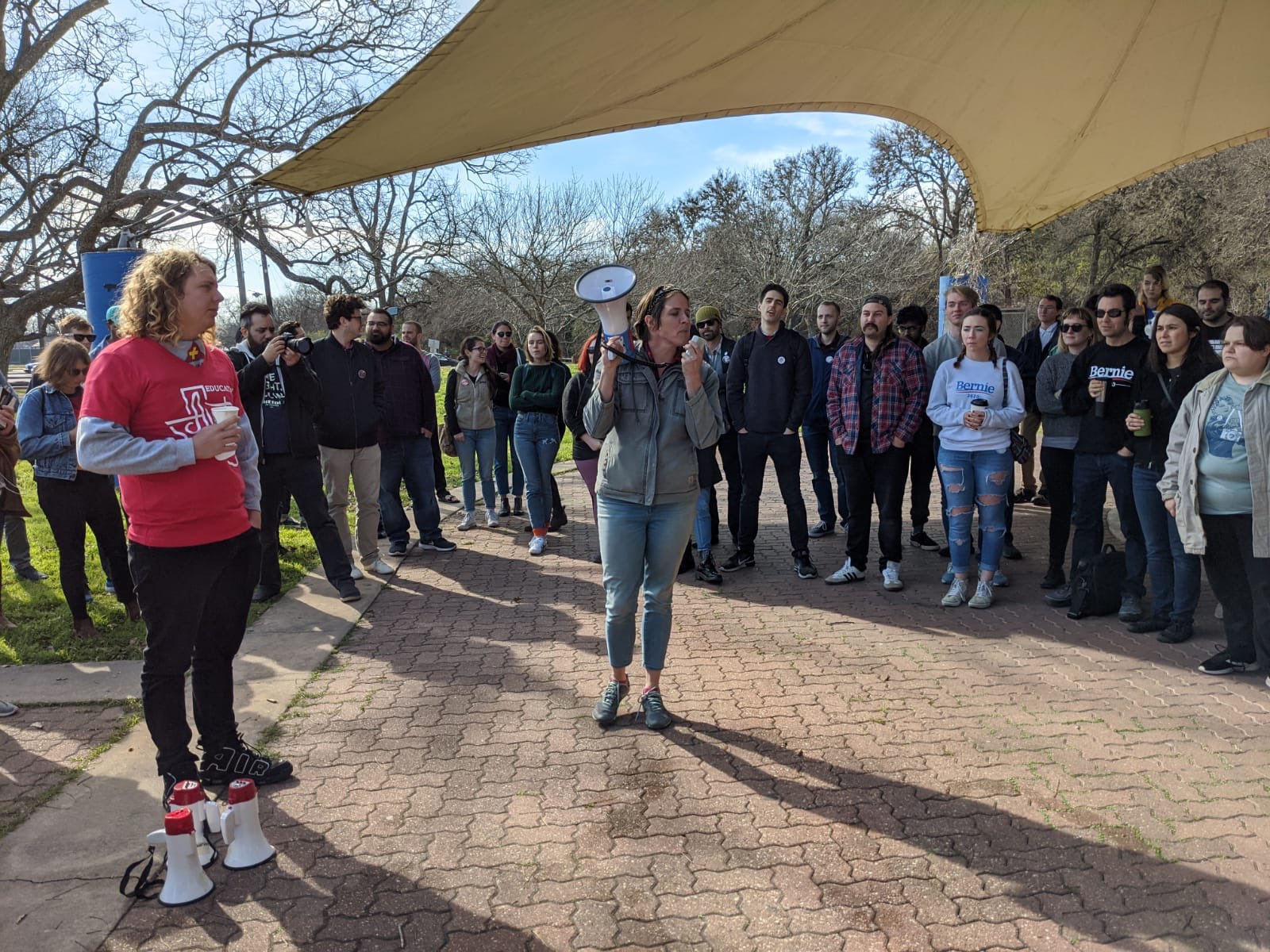Former congressional candidate Heidi Sloan reflects on the role of electoral campaigns in elevating working-class struggle, how socialists in office can use their position to organize, and the relationship between DSA and our elected officials.
By Heidi Sloan
Many of us, myself included, hold electoral politics at arm’s length for good reason. As socialists we see the escalation of “red” or “blue” identities as a vehicle for alienation and hostility that detaches elections from class or material conditions.
As long as a candidate is able to correctly answer what they are “for” or “against,” they are rarely forced to explain how they will accomplish anything they claim to stand for. This provides a convenient excuse for impotency. Even with the Democrats holding the triple crown of the presidency and both houses of congress, they are still unable or unwilling to effect change on climate policy, immigration, education, and much more.
And the result, of course, even when we have record voter turnout, is a hopeless stagnation. A sinking feeling that nothing ever changes. A political stage with a whole lot of acting and very little action.
While DSA continues to debate what kind of break we might eventually have with the Democratic Party, we know that right now, we must agitate. We must set ourselves and become known for both our agenda and our impact.
Organizing from Office
The seemingly impossible happened in 2021: Bernie Sanders became even more publicly involved in labor struggles. From Kellogg’s to John Deere, Bernie fanned the flames of Striketober and coupled his demands in the Senate to the workplace demands so prevalent in the Year of the Worker.
Freshman Representative Cori Bush slept on the Capitol steps to extend the eviction moratorium, demand investment in housing, and call for an end to homelessness. She followed policy stance with direct action, coalition, and a vision centering human rights.
José Garza was elected district attorney of Travis County the same summer that protests rocked the country and our backyard. The years leading up to Garza’s run for DA were characterized by criminal justice organizations in Austin pushing for city council to reimagine public safety. The local push and the national conversation came to a head all while this organizer ran on an agenda of holding the police accountable and keeping the weight of an unjust legal system off the backs of poor and working class Austinites. Garza was elected with the movement at his back.
From office, Garza both leveraged and grew the coalitions that had helped him get elected, using his office as a platform to further our shared agenda. His leadership and position were essential in trouncing Prop A. But it was his abilities as an organizer that helped generate broad organizational support, including from every labor union in Austin.
Looking to our endorsed candidates, we can already see the similarities between Cori Bush and a potential Representative Casar. Likewise, we can make a comparison between a future Justice of the Peace Hairston’s housing rulings with Garza’s mandate for police accountability. We can predict that if Bob Libal was elected as County Commissioner and pursued his stated agenda but did not leverage community support from office, he would present little more than a left pole for other Commissioners to rally against. As an organizer in office, though, Bob has the opportunity to bring stakeholders into a space where they have long been missing.
Organizing Into Office
If you are thinking that you’ll leave campaigning to folks who like that kind of stuff, I ask you to reconsider. If we want power with elected leaders who are able to influence our material conditions, we need a critical mass of engagement.
Having accountable relationships with endorsed elected officials means having the power to get them into, or out of, office. It is not romantic. But just as we know that the working class is not especially romantic in its relationship to capital, organizations are powerful when we are strong enough to start it up or to shut it down. DSA nationally is approaching a maturity at which this is possible, and Austin DSA is on the leading edge of that growth.
Electoral politics does not just build our power in relation to candidates. Electoral politics has the potential to build the organization itself. Our candidates will be supported by unions, worker organizations, environmental clubs, Democratic officials, etc. Few of these groups will show up to knock doors or phone bank for their candidates. And even among the more active endorsers, the outreach is largely limited in focus: they are there to spread a candidate’s name.
In contrast, Austin DSA approaches electoral politics as a way to organize the unorganized. Electoral endorsements give us the opportunity to highlight the intersection of a platform and the real life experience of someone at a door.
We run our own highly publicized canvasses, building the skills of our members as organizers. We welcome the fresh and the nervous as well as the seasoned and professional. We know it is going to take all of us to win today and tomorrow.
We cut our own turf, deciding which areas and which doors we want to knock. This means we can make choices like reaching out to apartment complexes not high on the Democratic party lists because the addresses and resident information is often out of date. As working class organizers, we know our politics are likely to resonate with tenants who move frequently.
And we, as working class organizers, can do so much more than update addresses. We can glean folks’ emails and phone numbers because we don’t just want them to vote in this one election. We want to know them. We want them to show up for rallies and pickets, at meetings and at the polls, at city hall, to do eviction court watch and mutual aid, and to help those same candidates achieve our agenda.
But elections are the most familiar venue for most of our neighbors to think about politics. For many folks, elections feel like the only political realm. For us, they can be a starting place.
The time is now for us to determine how we will show up to support our endorsed candidates. If we want to be top of mind when Andrew or Bob or Greg think through the organizing muscle that backs them, if we want to grow our organization and our strength by promoting candidates who stand firmly with both our vision and our strategy, we must act urgently.
We want to hear from you. Do you have a workplace story or editorial you’d like to share with us? Email us at redfault@austindsa.org!

